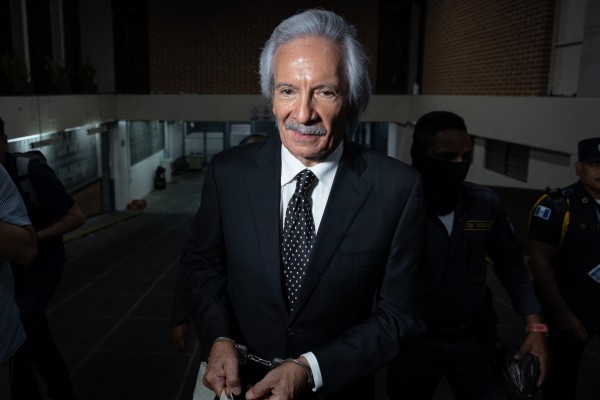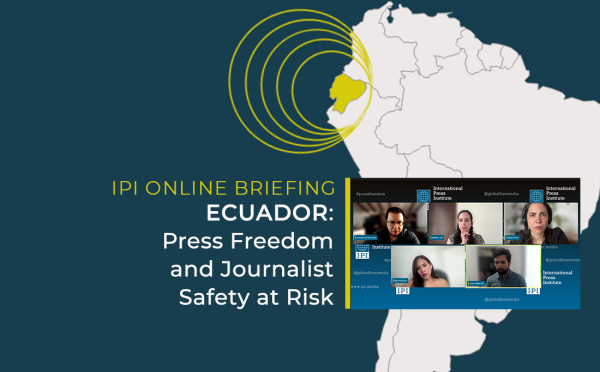Two Brazilian journalists working near the Paraguayan border were killed over the weekend, less than a week after the International Press Institute (IPI) released a special report warning of increased violence against the media in Brazil’s frontier regions.
The deaths of newspaper owner Onei de Moura and radio reporter Divino Aparecido Carvalho, both in Paraná state, add to an already grim picture of journalist safety in Brazil, which, according to IPI’s Death Watch, now trails only conflict-riven Syria in terms of journalist killings in 2012.
IPI Press Freedom Manager Anthony Mills said: “We condemn the killings of Mr. Moura and Mr. Calvalho in the strongest terms possible and extend our condolences to their families and colleagues.
“Unfortunately,” he continued, “we are seeing a deadly pattern of media-directed violence emerging in Brazil. While those working in the country’s largest cities enjoy a relatively high degree of press freedom, critical journalists in Brazil’s interior and border regions are being silenced with impunity – and at an increasingly alarming rate”.
Calvalho, also known as Calvalho Júnior, was ambushed around 5 am yesterday in Foz do Iguaçu as he arrived at Radio Cultura AM, where he worked as artistic director, according to local newspaper O Diario. Carvalho was to have hosted a variety program that morning called Show da Cultura, the paper’s report added.
A police investigator, speaking to local media, said Carvalho was shot three times while stepping out of his car, with one of the bullets hitting him in the throat. Despite the wound, Carvalho managed to drive himself to a local emergency station where, unable to brake, he crashed into a parked ambulance and was thrown up against the windshield. Emergency coordinators rushed Carvalho to a municipal hospital, but not before the journalist succumbed to his injuries.
According to news reports, the police investigator appeared to rule out the possibility of robbery as a motive. “They did not take anything, they were aiming to take his life,” the investigator explained, calling the attack “premeditated.”
Onei de Moura, owner of the weekly newspaper Costa Oeste, was shot and killed late Saturday night in Santa Helena, a town of 24,000 located approximately 100 km north of Foz do Iguaçu. Media reports say Moura was standing near a vending machine when a man with whom he had apparently quarreled earlier that evening in a bar emerged from a vehicle and shot Moura three times in the chest.
“Apparently, the victim had offended him” a police official told AFP on condition of anonymity, describing the cause of the shooting as “a personal issue.” An investigator with the Parana Civil Police said separately: “This appears to be a crime of impulse and not premeditated.”
However, multiple media sources reported that Costa Oeste was well known for its criticism of local politicians, a characteristic IPI has identified as being a major factor in journalist killings on Brazil ’s periphery. Given Moura’s position as a local leader of the Brazilian Social Democratic Party, a political motive has also been suggested.
The suspected gunman, Sérgio Adriani Schwann, turned himself him in yesterday, but was later released, despite confessing to the crime. According to the police official quoted earlier, a warrant has apparently not been issued for Schwann, meaning the latter was “a free man.”
Márcio Rodrigues, president of the Paraná Union of Journalists, told IPI that authorities have not been able to confirm that this past weekend’s victims were killed for reasons related to their professional activities. In his organisation’s view, the two journalists may well have been victims of urban violence.
He noted, however, that even if the latter explanation turned out to be true, the danger for journalists working in Paraná would continue. “This year began tragically for our profession. These two victims add to the number of other colleagues who have been attacked, threatened, or seen their lives cut short simply for fulfilling their obligation of covering daily news and reporting on the inadequate attitudes of those who are in power,” Rodrigues said.
Both Foz do Iguaçu and Santa Helena are located directly on Brazil ’s volatile and partially lawless border with Paraguay, where another journalist critical of local politicians, Paulo Rocaro, was gunned down in February. Rocaro’s death came five days after newspaper editor Mário Randolfo Marques Lopes was abducted and brutally murdered in the interior of Rio de Janeiro state.
Regarding the investigations of those two earlier deaths, Rodrigues added that although the deaths have not yet been explained, details that have emerged during the investigations indicate that the murder of Lopes may have been politically motivated, while that of Rocaro could be related to the journalist’s reports on international drug trafficking on the border between Brazil and Paraguay.
Mills emphasised that Brazilian authorities must immediately investigate the motivations behind the killings and bring those responsible to justice. “The time for Brazil to step up and protect all journalists working within its borders is now. An unfree press ultimately threatens the free flow of information, and all Brazilians – not just those living in the country’s centre – have a right to knowledge about the activities and institutions that affect their lives.”
Last year, 5 journalists were killed in Brazil, the country’s highest total since IPI began its Death Watch in 1997. Four of those killed both worked outside major urban areas and were known for their criticism of local officials.


